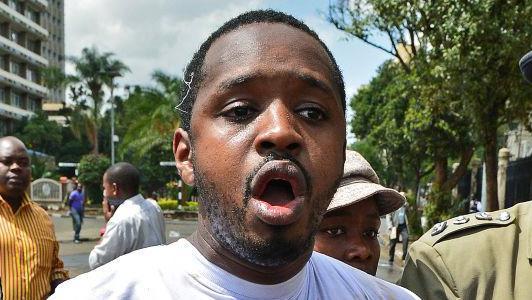Boniface Mwangi, a well-known Kenyan human rights activist, has recently been detained by police under accusations of inciting violence. His arrest followed an announcement he made calling for an anti-government protest at the Standard Chartered marathon in Nairobi. Eyewitness accounts from his wife, Njeri Mwangi, reveal that he was taken from their home by a group of masked individuals, raising immediate concerns about the legitimacy and circumstances of his detention. Police spokesperson Resila Onyango confirmed his custody but did not offer further specifics regarding the charges. This incident has ignited outrage among Mwangi’s supporters, who are mobilizing to demand his release.
Mwangi has been actively utilizing social media platforms, particularly X (formerly Twitter), to rally public dissent against the government, particularly targeting President William Ruto. He has been employing hashtags such as #RutoMustGo and #OccupyStanChart to mobilize citizens for the upcoming protest, encouraging participants to wear the national flag’s colors and share their protest messages online. His calls have resonated amid escalating public frustration over rising living costs and an increase in perceived government violence against protesters. Mwangi’s advocacy reflects the growing unrest among citizens dissatisfied with the current administration, which many feel has failed to address their socio-economic challenges.
Historically, Mwangi has faced multiple arrests throughout his activism, illustrating the tense relationship between the Kenyan state and critics of its governance. The latest protest call is perceived to be a strategic move aimed at sustaining pressure on President Ruto, who has been under growing scrutiny since taking office in 2022. Following a significant wave of protests in mid-2023 against proposed tax increases, Ruto attempted to alleviate public discontent by retracting these measures and incorporating the primary opposition party into his government. However, these efforts have not fully assuaged the discontent, as many Kenyans continue to voice their frustration over the administration’s handling of the economy.
The political context surrounding Mwangi’s arrest is significant; Ruto’s presidency has been marked by increased tensions following his electoral promises, which emphasized support for the marginalized “Hustler Nation.” However, his administration has faced a backlash from citizens after announcing contentious tax strategies that directly impacted economic conditions. Additionally, Ruto’s government has seen a shake-up with the recent impeachment of his deputy, Rigathi Gachagua, accused of various improprieties related to ethnic divisions and corruption. Despite these challenges, Ruto maintains that he is dedicated to governing fairly and improving the national economy.
Njeri Mwangi’s account of her husband’s abduction paints a distressing picture of the environment in Kenya for activists and dissenters. The circumstances of his arrest—conducted by unidentified individuals, including masked figures—raise serious concerns about the rule of law and the protection of human rights within the country. Legal representatives for Mwangi contend that the incitement charges are unfounded, reflecting a broader pattern of stifling dissenting voices in Kenya. The government’s response to public protests and activism has continually sparked debate about civil liberties and the democratic space in which such figures operate.
As the situation develops, Boniface Mwangi’s detention serves as a pivotal moment for human rights movements in Kenya, amplifying discussions about the balance between governmental authority and citizens’ rights to protest and criticize. The international community is closely watching the unfolding events in Kenya, aware that they may shape the country’s commitment to democratic values and human rights in the long term. The struggle between the government’s authority and the aspirations of its citizens comes to the forefront in such instances, marking Mwangi’s detention as a notable chapter in the ongoing narrative of political activism in Kenya.

